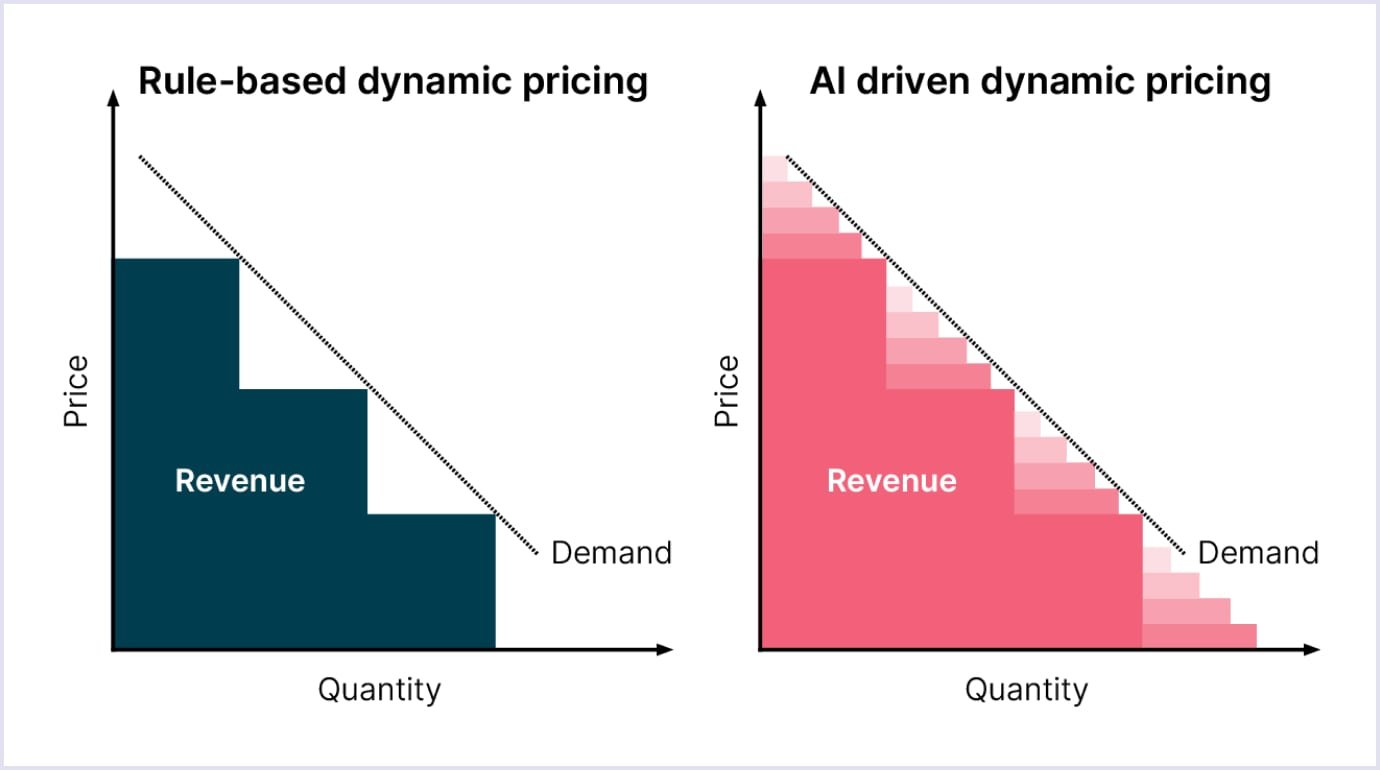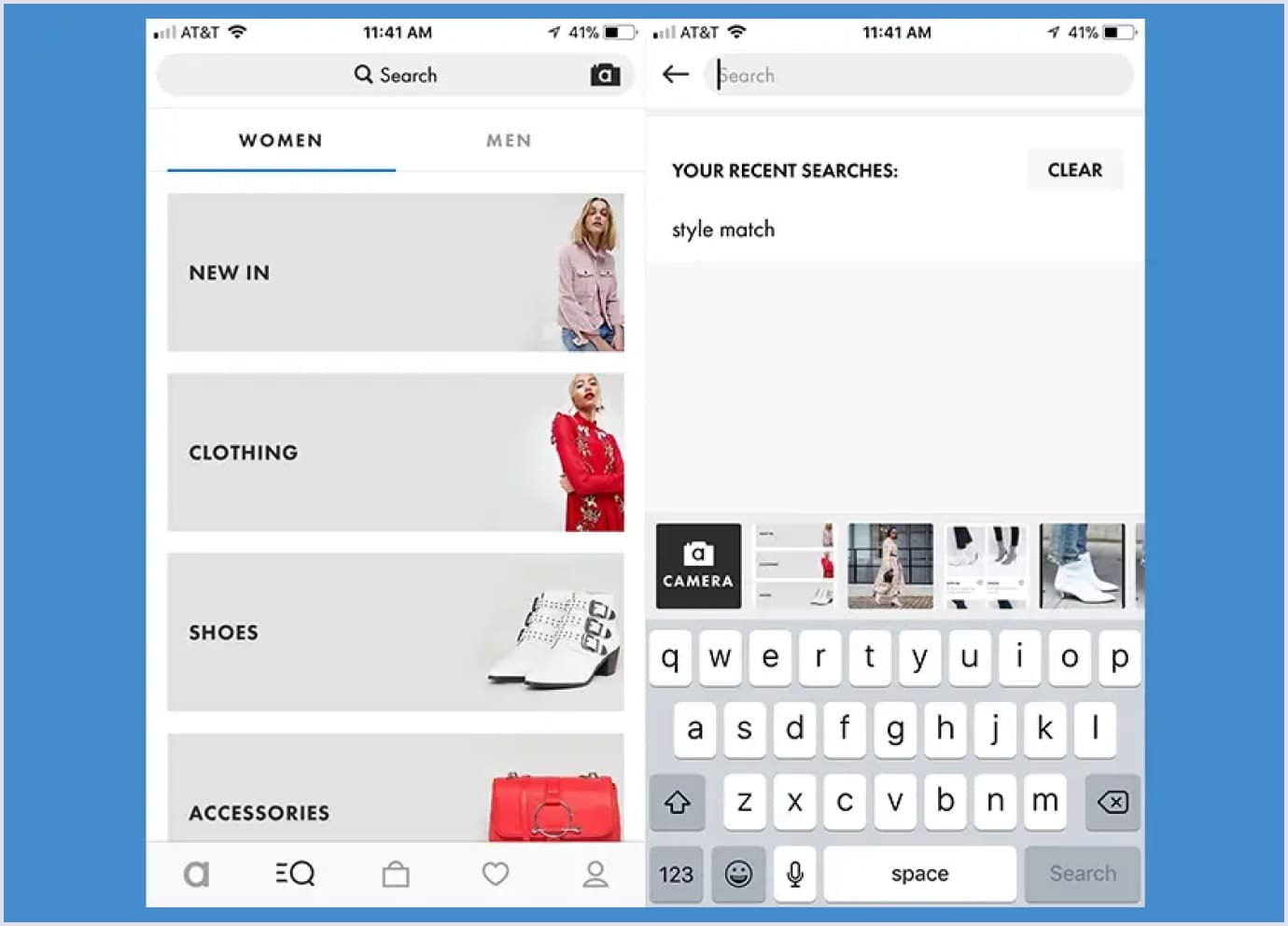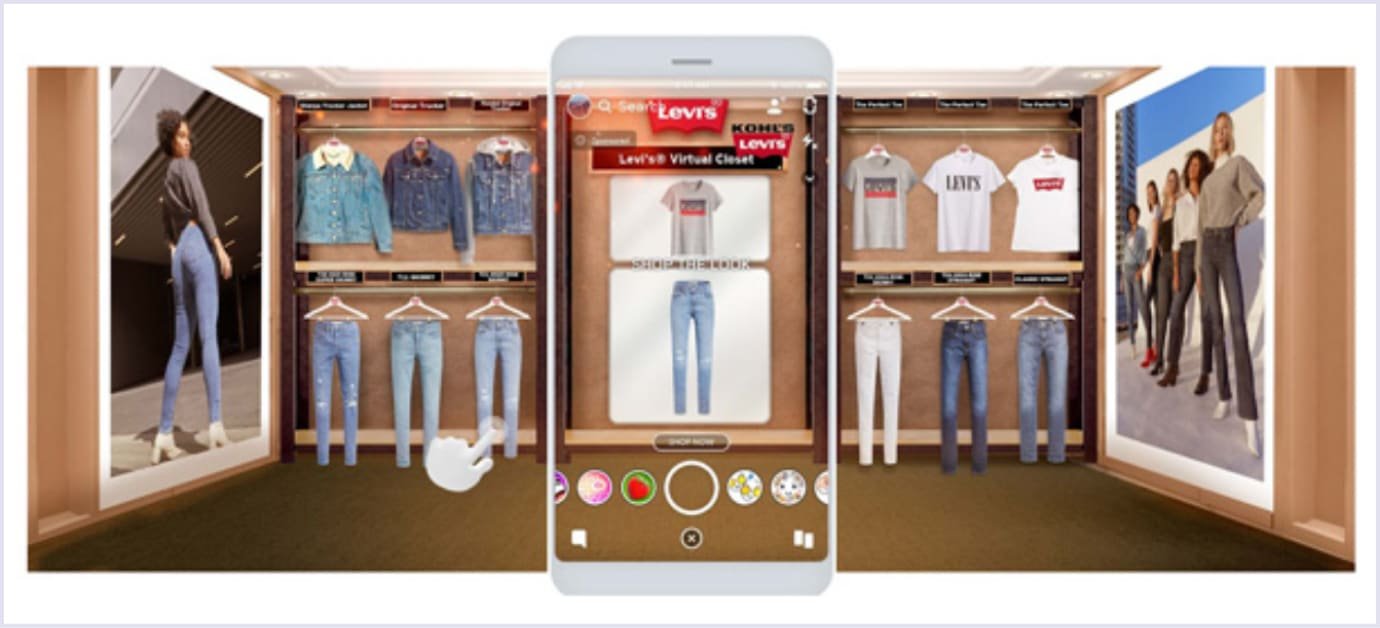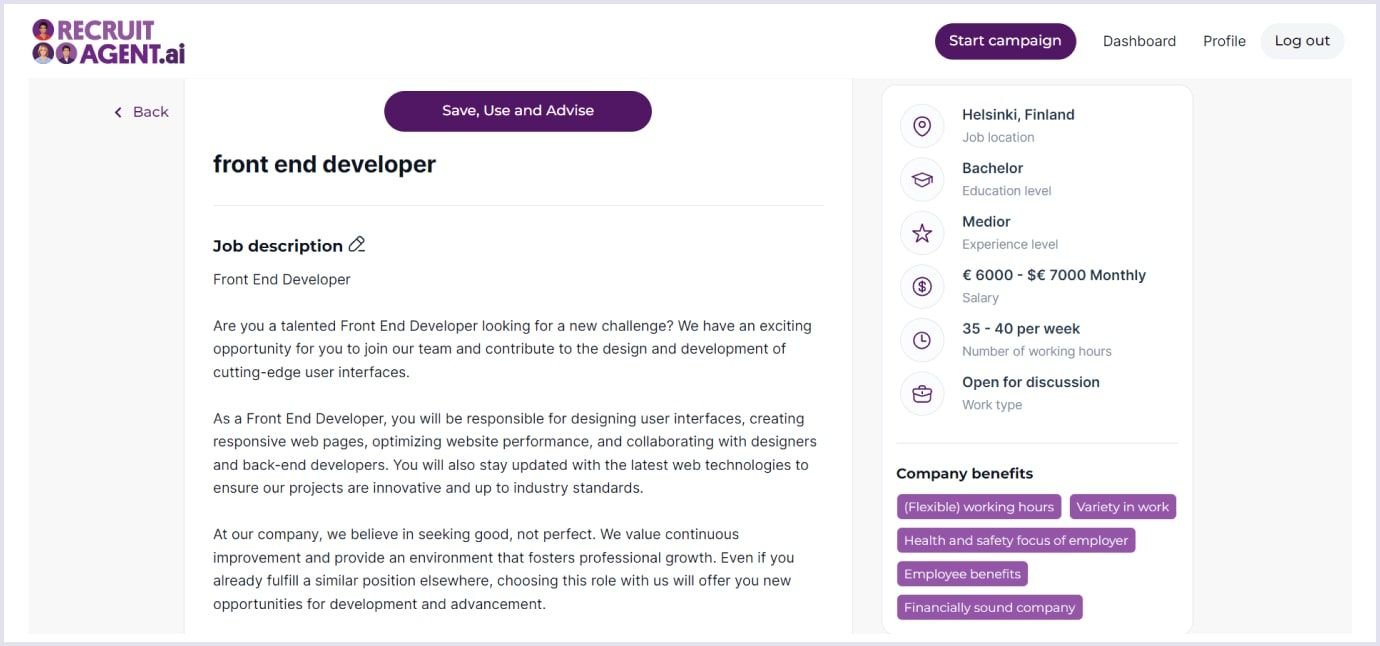Marketplace personalization is one of the top AI trends in retail that can increase your conversion rate by 8%. Artificial intelligence is a helpful tool to implement personalization. Thanks to analyzing massive chunks of data, AI improves your marketplace’s performance, usability, service, and trust.
This article covers how you can personalize your marketplace with AI and win from the future of AI in retail. Our experts share their experience so you can make an informed decision when building your ecommerce platform.
Let’s dive into it.
AI-powered personalization in online shopping
AI-powered product recommendations
Amazon was the first marketplace to introduce personalized recommendations, and it has done so for over twenty years. Today, personalized recommendations feel natural when shopping online. Such an option is integrated into an ecommerce marketplace solution to make online shopping even more enjoyable.
So, how does an AI-powered recommendation tool work? Well-thought-out recommendation engines analyze customer data to provide recommendations. Such data include browsing history, purchases, reviews, demographics, etc. Based on the results, the engines provide shoppers with customized suggestions.
Engagement and conversions are lifted as customers swiftly connect with the products and services they need during AI-powered shopping. For example, cosmetics retailer Sephora increased clicks on recommended products by 10-15%.

Better precision makes AI in online shopping recommendations stand out compared to manually curated suggestions. The amount of data AI engines process is immense, so AI in retail finds more accurate patterns and product associations. This accuracy increases and changes over time as AI processes more data.
Customized search results with AI
Thanks to the benefits of AI in retail, customers get tailored results when they search for products and services in online marketplaces. Instead of a traditional keyword search, you can type a phrase as you would naturally ask it, and the system will give you results.
For example, Walmart has introduced a search capability that enables you to shop for a specific situation. You can type: “What can I buy to watch football with my friends?” As a result, you can select from products most commonly bought on that occasion.
The future of AI search lies in deeper personalization. AI in online shopping will give recommendations yet leave customers space to choose from available options in the marketplace.
Generative AI in retail
Several helpful aspects define the role of generative AI in retail ecommerce. Generative AI use cases in retail include making operations fast, accurate, and cost-efficient. So businesses can focus more on growth, customer nurturing, and strategic planning.
In particular, generative AI in retail helps create accurate listings and personalized content for better customer engagement. An enhanced customer experience with AI in online shopping leads to increased customer loyalty and higher sales.
Moreover, marketplaces utilize generative AI in retail customer support. Leveraging streamlined responses to common questions with natural language processing (NLP) helps marketplaces provide self-service and reduce transaction time.
Enhancing customer interaction and support
AI-powered chatbots and virtual assistants
Another use of AI in marketplaces is chatbots and virtual assistants. These help improve customer journeys and buying experiences with AI in retail stores and online. So shoppers get personalized assistance at their fingertips.
The new standard in AI-powered shopping is chatbots and virtual assistants that understand the search intent. They enrich buyers’ experiences at any point of buying, such as searching, checking out, managing orders, and customer support. Though chatbots do not replace human support, they help resolve common issues and speed up selling operations.
Let’s consider AI in retail examples. Walmart’s Text to Shop allows users to tap their screen and enter one word. Then, the service will return available options or suggest adding a product you bought earlier to the cart. The service also handles the pickup times and checkout process schedule.

Personalized marketing campaigns using AI
Marketing strategy involves several aspects, each of which can be personalized with AI. Emails, messaging, website personalizations, and more help you tailor experiences in your marketplace.
When you send an email, you can outline a specific product. For example, your customer could receive a message such as: “Still interested in product? Check our catalog and get 10% off!” Such messages give your customers personalized product highlights and improve the click-through rate.
Another example of AI in retail marketing is leveraging social listening. Benefits of AI in retail include listening to customer reviews on your marketplace and analyzing their sentiment through the language they use. You can tailor your marketing strategy to customers’ feedback about your marketplace.
Improving retail operations with AI
AI-driven inventory management
Analyzing big data sets allows AI in the retail industry to find patterns and trends that help businesses track their inventory flow. Considering marketplace needs in servicing orders, AI helps prevent understocking and overstocking.
AI in retail analyzes inventory levels, sales data, supplier information, order data, logistics data, and more. Thus, it provides sellers and a marketplace owner with output on replenishments needed. It helps fill the stock with products based on actual demand. So, the marketplace has the right stock in the right amount for a better buying experience.
You can reorder stock, optimize inventory, and manage returns with AI. Moreover, AI analytics helps you forecast which products and amounts you will need.
Dynamic and personalized pricing strategies
You can analyze patterns and trends in your marketplace sales thanks to AI's data analysis. Moreover, AI in the retail industry analyzes your competitors and market trends. These are a foundation for developing a pricing strategy while maintaining profitability.
The pricing benefits of AI in retail include its ability to provide dynamic pricing. This process means that you can adapt your pricing strategy at once. AI collects real-time data on demand, inventory levels, and other factors. Then, it makes instantaneous changes in pricing.
Another advantage of AI in retail is setting prices according to demand trends. Thus, you can set your prices to maximize revenue without affecting demand. Below is a visualization of how dynamic pricing allows you to set flexible prices in response to changing demand.

With AI solutions in retail, you can also target specific audiences based on customer base segmentation. AI analyzes demographics, behavior, and purchase history to help you set personalized prices, enhancing your marketplace’s personalization and profitability.

Security and trust in AI-powered retail
AI in fraud detection and prevention
Analyzing massive data allows AI to recognize patterns and anomalies that can signal possible fraud. Machine learning models analyze large datasets and improve over time. As AI becomes more adept, it improves its analytical capabilities and accuracy with evolving fraud tactics.
AI online shopping models consider several factors, such as transaction size, frequency, and purchase history. They also mitigate card-not-present theft by finding discrepancies in shipping and billing data. Moreover, they help prevent return and refund fraud, which poses huge financial risks for retailers.
AI for content moderation and quality control
Marketplaces process many different types of content. So, AI in retail also helps with that. AI models allow you to monitor your marketplace’s content for fake reviews, spam, foul language, hate speech, and revealing personal information. This method makes your marketplace a trustworthy and friendly place for transactions.
Another option is to use AI for quality control. Thanks to image recognition technologies, you can inspect products for defects. Thus, you can remove defective products before shipping them to your customers. Moreover, you can control packaging, order fulfillment, and customer service with AI to keep high-quality standards.
Future trends and innovations in AI retail
Voice and visual search capabilities
AI in the retail industry helps you find items by speaking by simply clicking on the microphone icon on your phone. This method has become popular among users and represents the future of AI in retail. For example, 43% of people who rely on voice search use it for online shopping.
Also, shoppers can find products with AI-powered image search. Thanks to the AI shopping system and deep learning technology, you can upload a photo of a product you like and get matching results.
Let’s turn to artificial intelligence in retail examples. One of the cases is ASOS’s Style Match Feature, which helps you find products that match your photo in the app.

AI in augmented reality (AR) shopping experiences
Augmented reality means integrating digital information with the user’s environment in real-time. Thus, you can try how the product will look in your real-world environment, try on clothes, and participate in gamified shopping experiences.
For example, Kohl’s, a clothing, shoes, and jewelry store, cooperated with Snapchat to create a Virtual Closet. This is a Kohl’s app service that allows users to select and match items using the app. It also highlights top styles to provide customers with recommendations.

Build your AI marketplace with Codica
Given AI's valuable benefits to personalization, it is wise to implement it in your online marketplace development. By improving your service, you will attract more customers to your platform.
Codica is your reliable partner in making your marketplace an enjoyable place to sell and buy. Among our web projects, we have created dozens of marketplaces and used enhanced AI tools to make them more user-friendly.
For example, the ChatGPT integration we implemented in a resume-search platform helps HR specialists post job openings quickly. The vector database we integrated gives accurate matches of professions that are standard for job posting on prominent platforms. Thanks to semantic search powered by AI, recruiters easily find the matching profession names and compile job descriptions.
Below is an example of vacancy after generation with AI tools.

To wrap up
AI personalization is a powerful tool for making your marketplace performant, enjoyable, and secure. As a result, more buyers and sellers will join it and return for repeat transactions. Thanks to the ability to process large datasets and evolve over time, AI in retail helps you advance your platform with personalized experiences.
Ready to transform your marketplace with AI personalization? We are eager to help you with it. Contact us to discuss your project and get a free quote.
